A superb, hard-to-find epic…
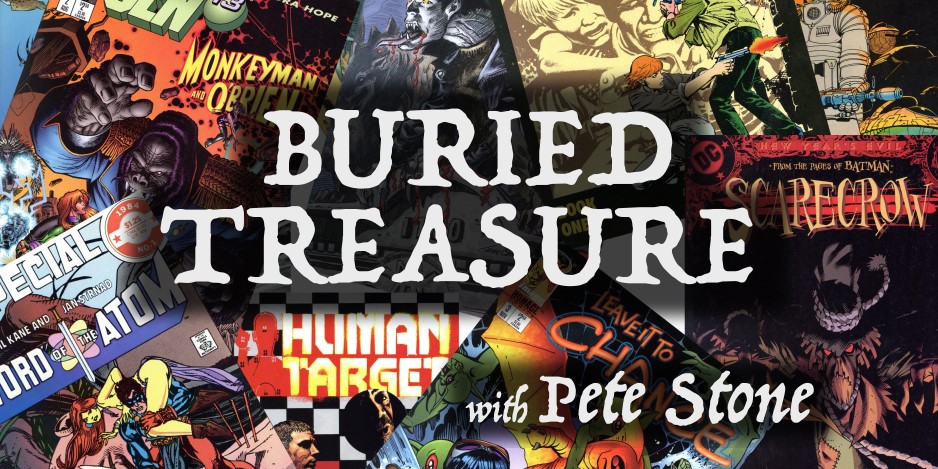
By PETER STONE
The big news that exploded like an atom bomb out of the Marvel Cinematic Universe recently was that Robert Downey Jr. is coming back as Iro—wait! Not Iron Man, but rather one of the greatest villains in the entire Marvel Universe. A brilliant, armored dictator who consistently drives the Fantastic Four right to the brink of destruction, a genius who actually invented a time machine, and ruler of an Eastern European country named Latveria – Dr. Victor Werner Von Doom!
Dr. Doom first appeared in Fantastic Four #5, July 1962, searching for revenge on his college roommate, Reed Richards. Doom believed Richards had sabotaged the project Doom was working on, causing an explosion that left Doom facially scarred for life. Decades of fan controversy, after a rough origin of Doom was printed two years later, started about how scarred was Doom’s face. Hideously deformed or a simple nick? In the 1970s, Jack Kirby drew him with a simple, tiny imperfection commenting that Doom was so vain, even the smallest scar would drive him insane with fury.
Doom went on to become one of Marvel’s greatest villains, fighting almost every superhero in the publisher’s entire pantheon. However, there was more to Doom’s storied history and it required a far more extensive exploration.
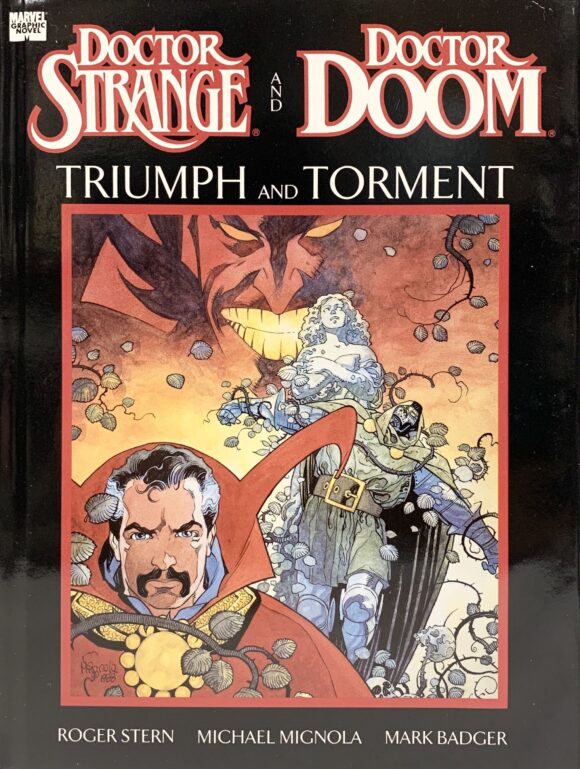
In July 1989, the company was in the midst of its Marvel Graphic Novel series, which had included such notable titles as The Death of Captain Marvel (1982), The New Mutants” (1982), Daredevil: Love and War (1986) — and a special Dr. Strange graphic novel called Dr. Strange and Dr. Doom: Triumph and Tragedy. Published in 1989, it was written by Roger Stern and penciled by the soon-to-be-famous Mike Mignola. Mark Badger provided the inks and color. I remember buying it and discovering that Dr. Doom was a sorcerer as well as a genius mechanical engineer.
Triumph and Tragedy is a story that fills in some of the mystical world Dr. Strange exists in and just how skilled he is as a mage. When a once-every-100-years contest is called by an ancient Genghis, the magicians of the world gather to compete to obtain the title of Sorcerer Supreme… and Dr. Doom appears as well. The others are stunned, but Doom says he was mystically summoned and deserves to be there.
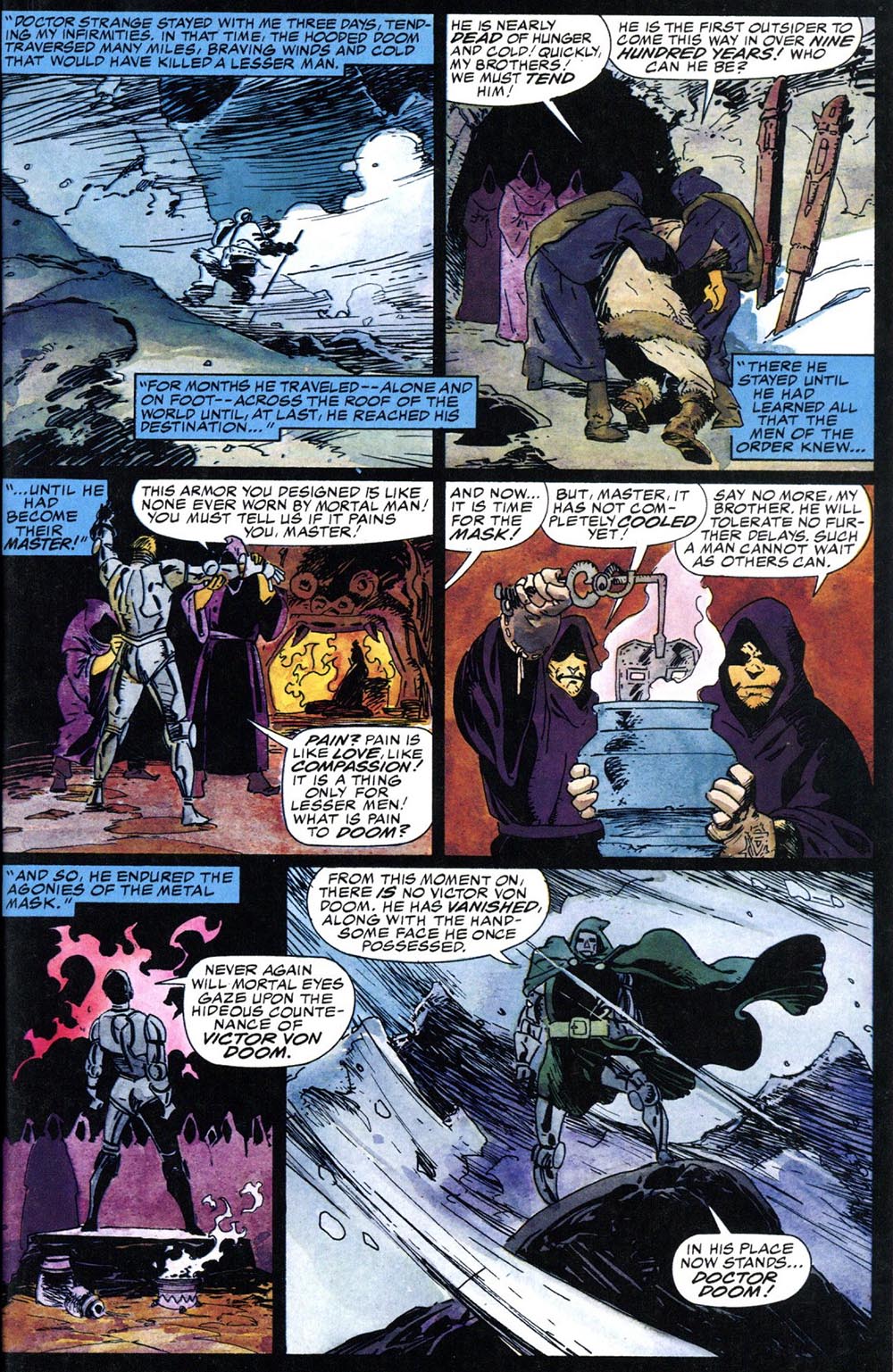
Soon enough, the battle begins and the greatest sorcerers on the planet must free the mystical Vishanti from a crystal. All of the sorcerers are destroyed except for Dr. Strange and Dr. Doom. Dr. Strange emerges as the Sorcerer Supreme and for that honor, he must grant a boon to Dr. Doom. Dr. Strange refuses to help Doom take over the world, but Doom says that’s not what he wants. He just wants to free his mother’s soul from Mephisto.
This brings us to the reason this graphic novel is a Buried Treasure. Dr. Strange journeys to Latveria where he discovers that the citizens love their armored leader. The dictator’s closest friend and the man who helped raise Victor Von Doom reveals Doom’s detailed origin story, including the tragedy of Doom’s mother, a gypsy sorceress named Cynthia. Her story includes her dabbling in the mystic arts until Mephisto himself makes her a deal to save her people… and her son. However, as we all know about demons, they lie, cheat and steal. Mephisto’s deal dooms Victor’s mother to Mephisto’s realm and begins her son’s journey toward Dr. Doom.
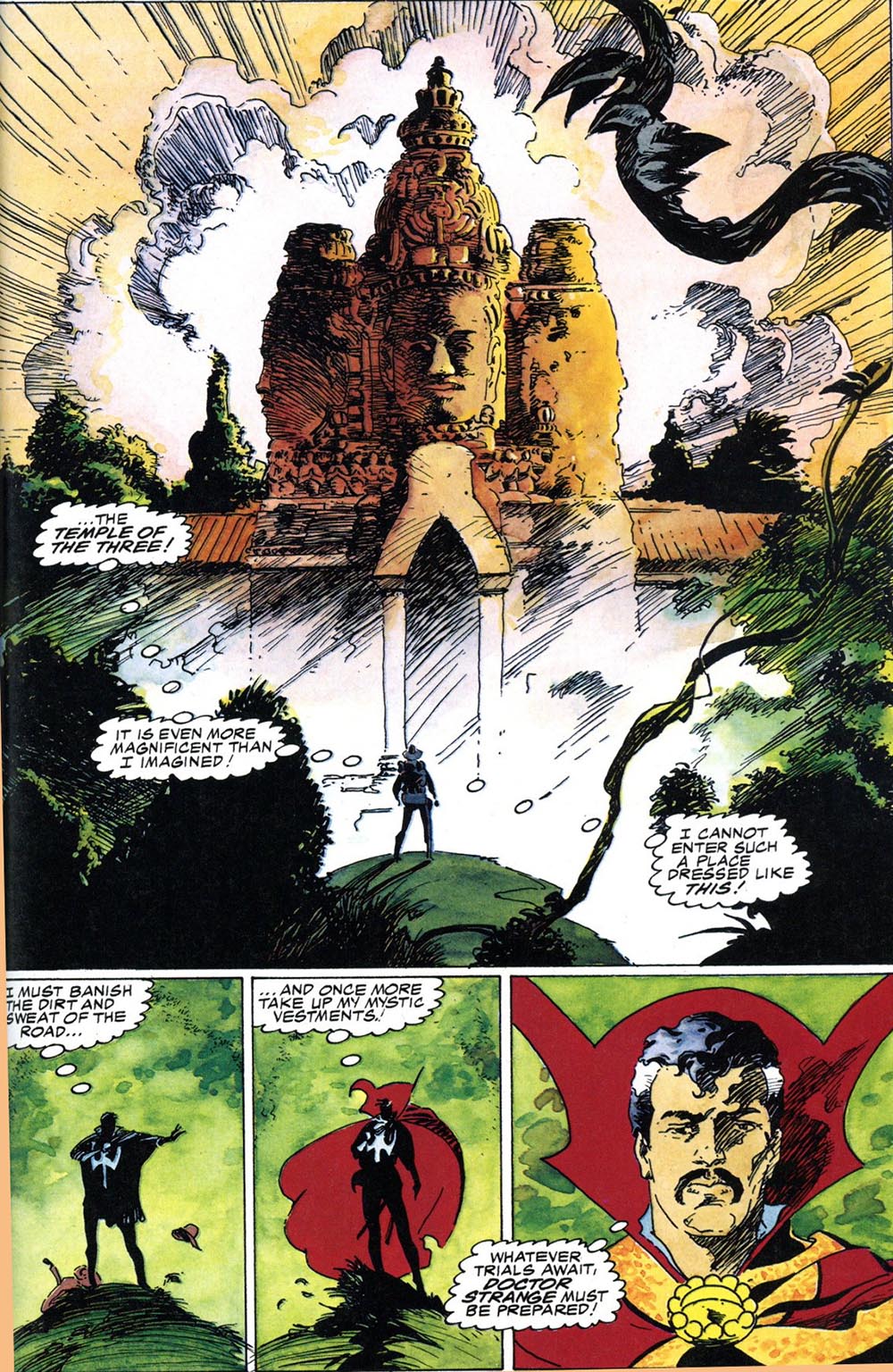
The origin story is carefully crafted and well written. It reveals parts of Doom’s origin that Jack Kirby himself did not have the space to tell. Roger Stern added a subtlety and compassion to the saga, making the reader feel for a young Victor Von Doom and bringing an understanding to the future ruler of Latveria. I suppose that because this is a Dr. Strange story, the origin story leaves out the relationship of Victor and Reed Richards, but it flows along quite nicely.
The conclusion is the event the story has been barreling toward since Page 1, Mephisto versus Dr. Strange and Dr. Doom for the soul of Cynthia Von Doom. The result seems to be not something Doom would want, but the reader is reminded that Doom is not to be underestimated. Was this part of his master plan all along? Stern manages to capture the unique character of Victor Von Doom, making him sympathetic and tyrannical at the same time. Is he a human who wishes to free his mother from a demon or is he a despotic ruler who will sacrifice anyone to achieve his malevolent goals? Stern leaves it for us to decide.
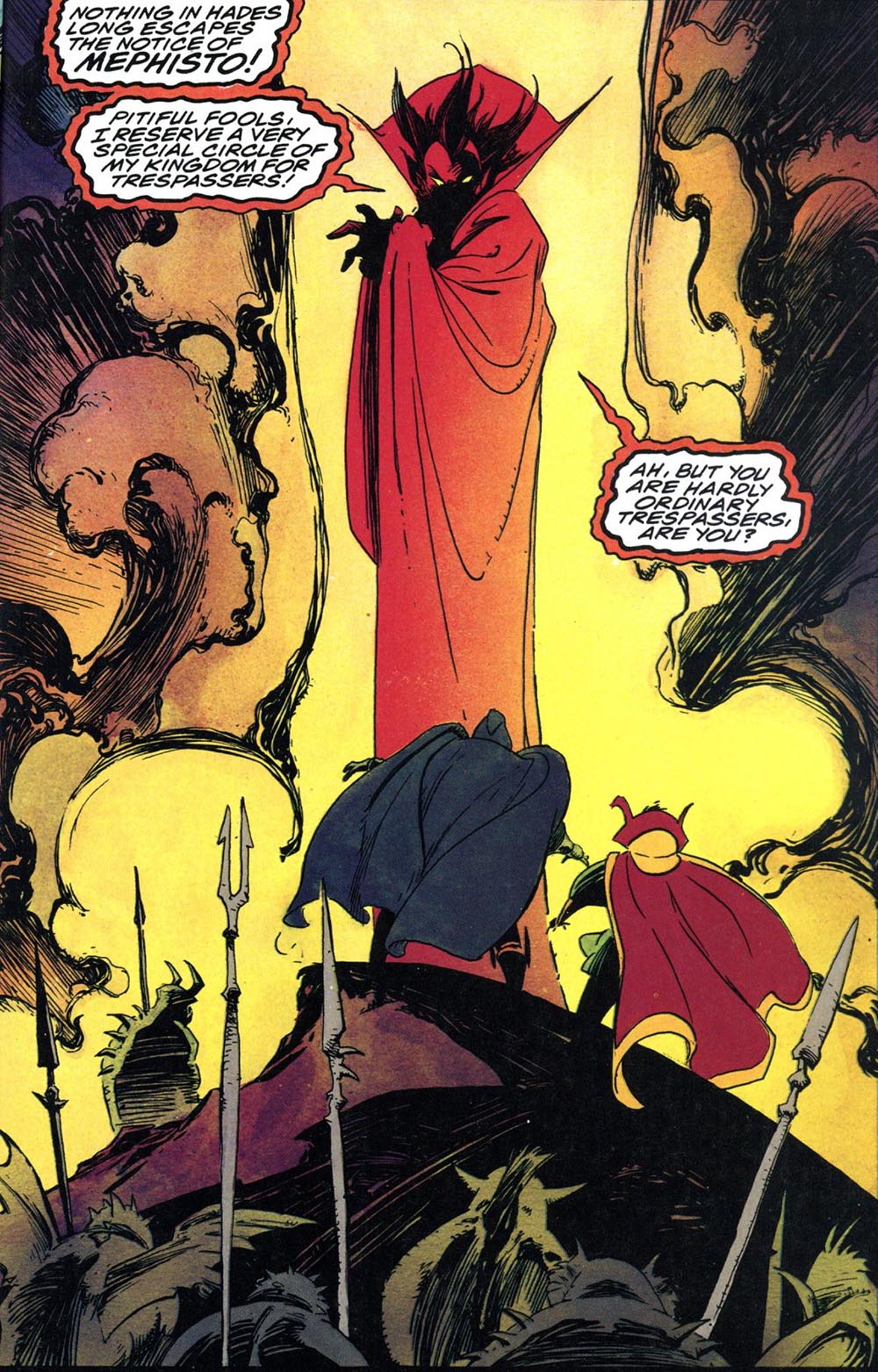
The second treasure in this graphic novel is the art by Mike Mignola. This story was drawn around the same time he illustrated Cosmic Odyssey, Gotham by Gaslight and Wolverine: The Jungle Adventure. Hellboy is four years in the future, but Mignola was rapidly becoming a superstar. His work was different from anything we had seen in comics before. His pencils on the Wolverine job were great and his atmospheric work on Gotham by Gaslight inspired an animated movie decades later. He was an inspiration at the time. And he still is.
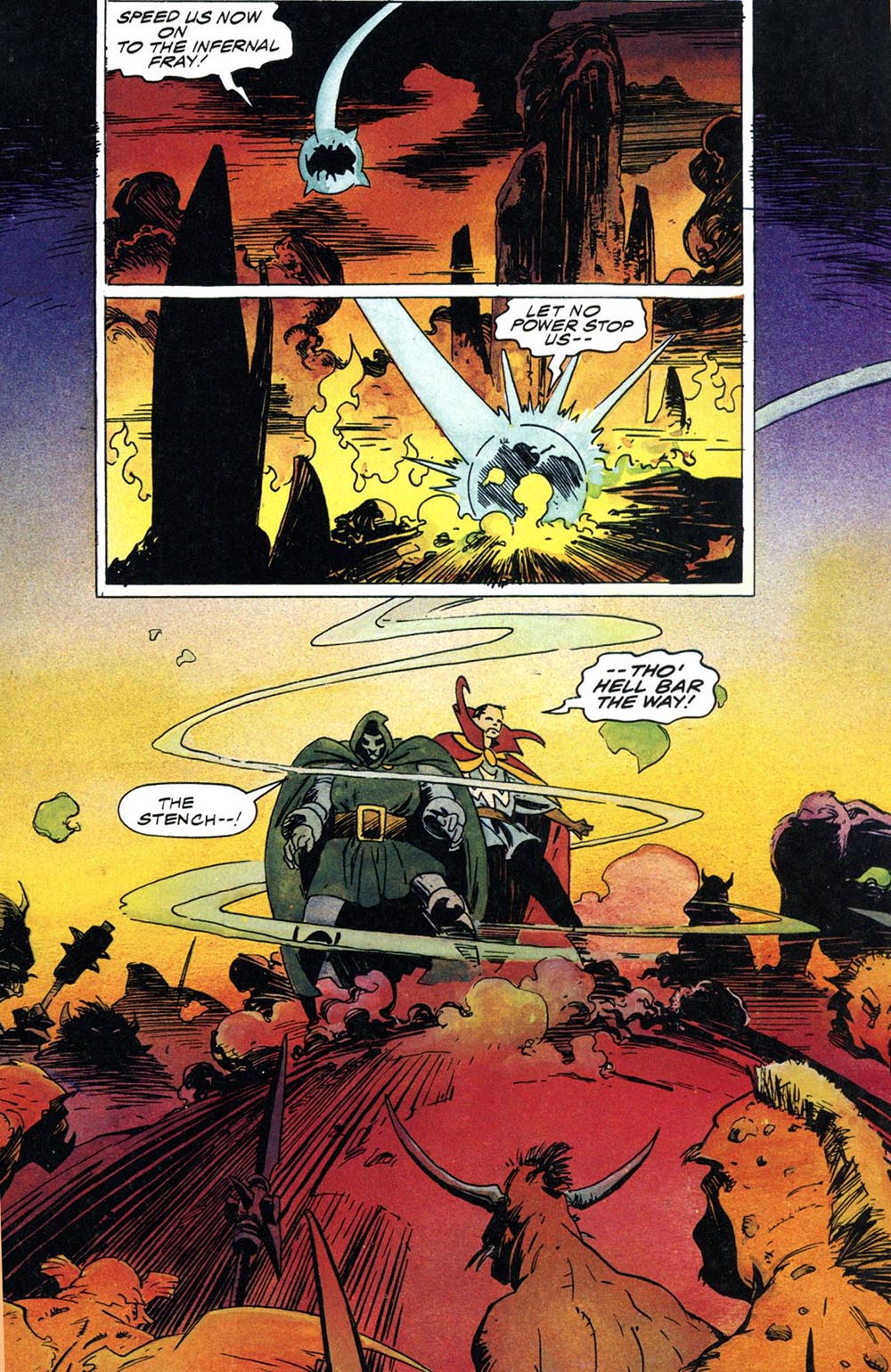
I would also be remiss if I didn’t mention Mark Badger’s somewhat rough inking and subdued coloring. All in all, the graphic novel comes together very well.
The best way to get ahold of this story is through the Dr. Strange Epic Collection appropriately named Triumph and Torment because the original graphic novel is pretty expensive. I think you’ll find this a pleasant surprise and a fun read as we prepare for the upcoming appearance of Dr. Doom in the MCU.
—
MORE
— BURIED TREASURE — DEADPOOL: Wade Wilson’s War. Click here.
— BURIED TREASURE: Kurt Busiek and Stuart Immonen’s SHOCKROCKETS. Click here.
—
Peter Stone is a writer and son-in-law of the late Neal Adams. Be sure to check out the family’s twice-weekly online Facebook auctions, as well as the NealAdamsStore.com, and their Burbank, California, comics shop Crusty Bunkers Comics and Toys.

September 24, 2024
Oh, I’d forgotten this!
September 24, 2024
I bought this off the rack in 1989, my senior year of HS. And I still have it.
September 27, 2024
“Farewell, Dark Lord.”is probably the most bad-ass thing Ive ever read in a comic book.
October 17, 2024
I had always heard that this was a high point of both Dr. Strange…and scribe Roger Stern’s career. Somehow, I never got around to reading it… possibly because as a graphic novel, it was priced somewhere out of my weekly allowance restrictions. Is it as good as they say?
October 18, 2024
>> His work was different from anything we had seen in comics before. >>
I always thought his pencils were reminiscent in the vein of Michael Golden or Walt Simonson. Reading this story eludes me but I must have as the elements shared here are very familiar.